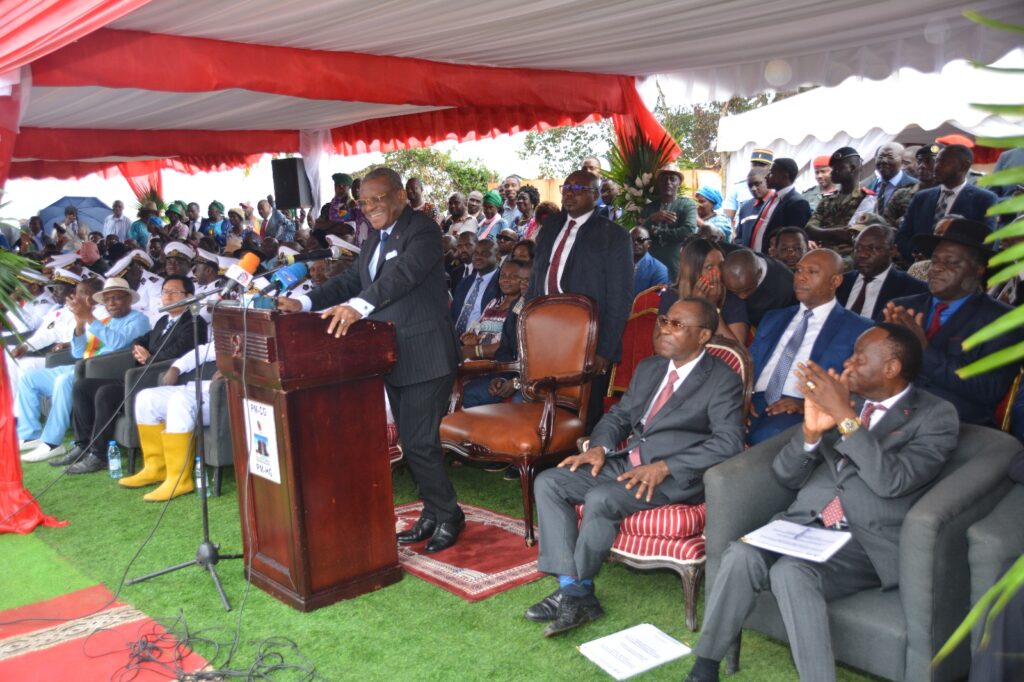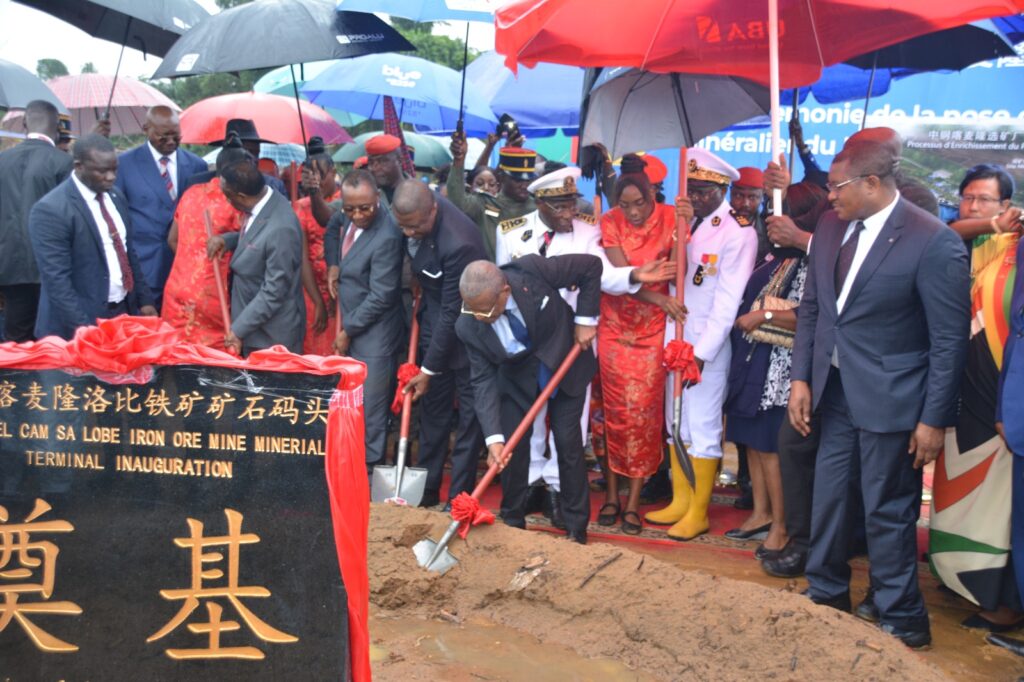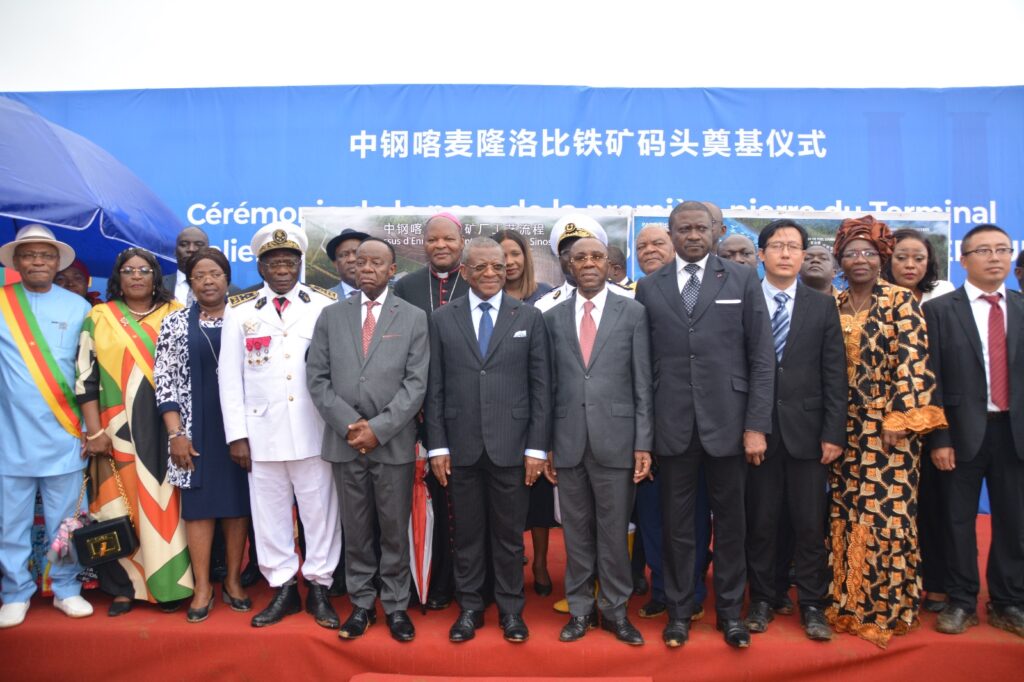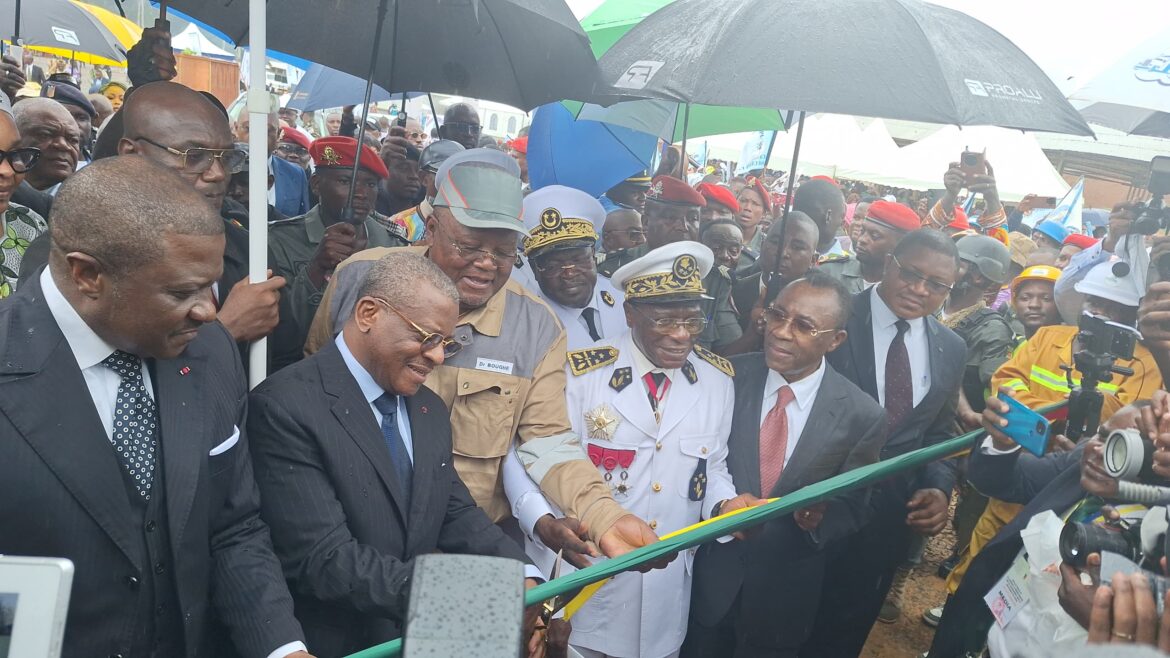A cornerstone of President Paul Biya’s strategy for developing Cameroon’s mining sector was inaugurated on Monday, as the Prime Minister, Dr Chief Joseph Dion Ngute, officially launched the Bipindi-Grand Zambi iron ore industrial mine.
Representing the Head of State, PM Dion Ngute presided over the ceremony, which was attended by several senior government officials. These included the Interim Minister of Mines, Industry and Technological Development, Prof Fuh Calistus Gentry; the Minister of State for Higher Education, Prof Jacque Fame Ndongo; the Minister of Transport, Jean Ernest Masena Ngalle Bibehe; and the Minister of Post and Telecommunications, Minette Libom Li Likeng. Local administrative, municipal, and traditional authorities, alongside members of the public, were also present.
The launch was preceded by the laying of the foundation stone for the Kribi-Lobe iron ore project’s mineral terminal at the Port of Kribi. The two projects, being implemented by SINOSTEEL Cameroon SA and G-Stone Resources SA respectively, are seen as a major step towards realising the President’s vision of establishing Cameroon as a mining hub in Africa.

This development marks a historic milestone: the approval for Cameroon’s first-ever export of iron ore to foreign markets. This initial shipment originates from the Bipindi-Grand Zambi site, following over 12 years of preparatory work and the commencement of construction in June 2022. The multi-million dollar project is located in the Bipindi and Grand Zambi localities in the Ocean Division of the South region.
PM Hails a “Historic Moment” for the Mining Sector
In his keynote address, Prime Minister Dion Ngute described the launch as a “historic moment” and a decisive step towards developing the country’s metallurgy and steel industry. He stressed that the project aligns with President Biya’s National Development Strategy and Vision 2035, which aims to transform Cameroon into an emerging nation.
“This strategy is based, among other things, on the structural transformation of the national economy to stimulate sustainable industrialisation,” the Prime Minister stated. “The Head of State identified the Bipindi-Grand Zambi iron ore mining project as a lever for developing solid mining, through which additional mining resources would become available.”
He revealed that the rich potential of the Bipindi area, with an estimated reserve of 150 million tonnes of magnetite ore, led the government to include it among 16 priority mining projects.
Accolades for G-Stone Resources
The Prime Minister praised G-Stone Resources SA and its leader, Dieudonné Bougne, for their “tremendous efforts” since work began in 2022. He noted that the company has already constructed an iron ore processing plant and a concentration plant, aiming for an annual production of one million tonnes of iron concentrate. A second plant under construction is expected to increase annual production to three million tonnes.
The PM also mentioned plans for a steel complex that would use the iron concentrate to produce 500,000 tonnes of iron billets per year for regional markets.

Significant Economic Spin-Offs Expected
According to the Prime Minister, the project will generate significant benefits for the country, including the creation of nearly 3,500 direct and indirect jobs. He emphasised its role in revitalising the national economy through contributions to various development funds, as well as generating state revenue from taxes, duties, and royalties.
“In view of the data I have just mentioned, you will agree with me that the investment is colossal. The results are significant,” he stressed.
Local Welcome and Political Support
The Mayor of Bipindi, Elias Bilong, welcomed the project, citing job opportunities and positive economic fallout for the local population. He thanked President Biya and, referencing the upcoming elections, reassured the Head of State—an “emblematic son of the South region”—of the population’s “unflinching support.”

Gratitude from Project Leader
Dieudonné Bougne, President Director General of G-Stone Resources SA, acknowledged the “multi-dimensional support” received from local communities and authorities over the past 12 years. He extended particular gratitude to President Biya for his personal follow-up, which ensured the project faced no administrative obstructions.
SINOSTEEL’s Mineral Terminal Foundation Stone Laid
Following the Bipindi launch, the Prime Minister travelled to the Kribi seaside to lay the foundation stone for a mineral terminal, a key component of the separate Kribi-Lobe iron ore project managed by SINOSTEEL.
This project, with an estimated reserve of 632 million tonnes of iron ore, has a projected mine life of 45 years and an estimated production rate of 8 million tonnes of iron concentrate per year. The state is entitled to approximately 10% of the company’s turnover, plus taxes and dividends.
The new terminal will enable the shipment of up to 14 million tonnes of iron concentrate annually. In the long term, the modular terminal could handle up to 47.5 million tonnes of ore, generating significant revenue for the Public Treasury.

